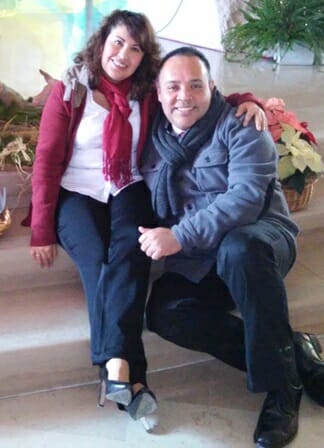
1 Feb 2015 | Focolare Worldwide
 Two voices intertwine in a crescendo of suffering and of hope, of deep emotion and of wonder. They lead us to discover the secret which has brought them to recompose that unity which seemed to be irreparably broken. It is Fili who begins their story: “Nacho and I have been married for 24 years and we have two children. I am the sixth of eleven siblings. There were many sufferings in my family, like that of discovering that my father had another wife and other children and this made me suffer a lot.” “Me, too, as a child,” Nacho continued, “I suffered due to the absence of my father and the lack of attention from my mother. It was my maternal grandmother who took care of me. With Fili we were in love when we got married, but there was a great existential emptiness wherein each one of us identified with the other. We united our solitude, but we didn’t know each other deeply and soon enough we realized that we didn’t know how to love and even what love means.” “Our problems started from the very beginning of our marriage – Fili continued. I was very jealous and possessive, up to the point that Nacho had to continuously change jobs». «Her attitude – Nacho followed – caused feelings of resentment, anger and frustration in me and the discussions between us were never-ending. Our children were born and grew up in this kind of unhospitable atmosphere. Both Fili and I loved them very much, but since there was no love between the two of us, we thought that we could fill this up by showering them with material goods, when instead we should have given them a listening ear, tenderness and affection. Thus 15 years passed. Disappointed by this situation, I left our home. I had already done this before, but every attept to come back and rebuild our relationship failed. What could I do, I asked myself, when a relationships is completely broken?” Fili continued: “In fact for me it was impossible to rebuild it, so much so that I allowed him to return only because I saw how the children suffered because they needed him. One Saturday evening,” Nacho said, “I was watching a boxing match on TV. It didn’t seem to be interesting so I changed the channel. I happened to see a religious program and out of curiosity I continued to watch it. There was a woman (later on I learned that it was Chiara Lubich) who was speaking about Love. Her word had such a strong impact on me. At the end of her talk, they showed some images of the little town of the Focolare Movement in Mexico, that is situated near our town, but which I didn’t know about». “So, the next day,” Fili continued, “we went to Mass at the El Diamante (this is the name of the little town) with the whole family. There I was struck by the way they welcomed us, it was as if they had known us from the beginning. The Mariapolis, a gathering which was going to be held precisely there, was just a week away but we decided to go. The proposal on the first day was the phrase from the Gospel: “Forgive seventy times seven times”. I asked myself: is it possible to forgive always? I found the answer when they spoke to us of Jesus Forsaken: He didn’t only forgive us but he gave his life for us. I realized that in front of such a love, my sufferings were very small. It was not easy to start again, but the Word “Forgive seventy times seven times” has always helped me to do it.” “For me too,” Nacho confided, “‘that Mariapolis turned my life upside down. I learned how to have faith in God for whom everything is possible. With Fili we have learned how to love each other in our diversity. Slowly we have fallen in love once again with one another. We discovered a fullness of love that we have never experienced before, not even when we were engaged, because now we love each other in freedom, in God.”
Two voices intertwine in a crescendo of suffering and of hope, of deep emotion and of wonder. They lead us to discover the secret which has brought them to recompose that unity which seemed to be irreparably broken. It is Fili who begins their story: “Nacho and I have been married for 24 years and we have two children. I am the sixth of eleven siblings. There were many sufferings in my family, like that of discovering that my father had another wife and other children and this made me suffer a lot.” “Me, too, as a child,” Nacho continued, “I suffered due to the absence of my father and the lack of attention from my mother. It was my maternal grandmother who took care of me. With Fili we were in love when we got married, but there was a great existential emptiness wherein each one of us identified with the other. We united our solitude, but we didn’t know each other deeply and soon enough we realized that we didn’t know how to love and even what love means.” “Our problems started from the very beginning of our marriage – Fili continued. I was very jealous and possessive, up to the point that Nacho had to continuously change jobs». «Her attitude – Nacho followed – caused feelings of resentment, anger and frustration in me and the discussions between us were never-ending. Our children were born and grew up in this kind of unhospitable atmosphere. Both Fili and I loved them very much, but since there was no love between the two of us, we thought that we could fill this up by showering them with material goods, when instead we should have given them a listening ear, tenderness and affection. Thus 15 years passed. Disappointed by this situation, I left our home. I had already done this before, but every attept to come back and rebuild our relationship failed. What could I do, I asked myself, when a relationships is completely broken?” Fili continued: “In fact for me it was impossible to rebuild it, so much so that I allowed him to return only because I saw how the children suffered because they needed him. One Saturday evening,” Nacho said, “I was watching a boxing match on TV. It didn’t seem to be interesting so I changed the channel. I happened to see a religious program and out of curiosity I continued to watch it. There was a woman (later on I learned that it was Chiara Lubich) who was speaking about Love. Her word had such a strong impact on me. At the end of her talk, they showed some images of the little town of the Focolare Movement in Mexico, that is situated near our town, but which I didn’t know about». “So, the next day,” Fili continued, “we went to Mass at the El Diamante (this is the name of the little town) with the whole family. There I was struck by the way they welcomed us, it was as if they had known us from the beginning. The Mariapolis, a gathering which was going to be held precisely there, was just a week away but we decided to go. The proposal on the first day was the phrase from the Gospel: “Forgive seventy times seven times”. I asked myself: is it possible to forgive always? I found the answer when they spoke to us of Jesus Forsaken: He didn’t only forgive us but he gave his life for us. I realized that in front of such a love, my sufferings were very small. It was not easy to start again, but the Word “Forgive seventy times seven times” has always helped me to do it.” “For me too,” Nacho confided, “‘that Mariapolis turned my life upside down. I learned how to have faith in God for whom everything is possible. With Fili we have learned how to love each other in our diversity. Slowly we have fallen in love once again with one another. We discovered a fullness of love that we have never experienced before, not even when we were engaged, because now we love each other in freedom, in God.”
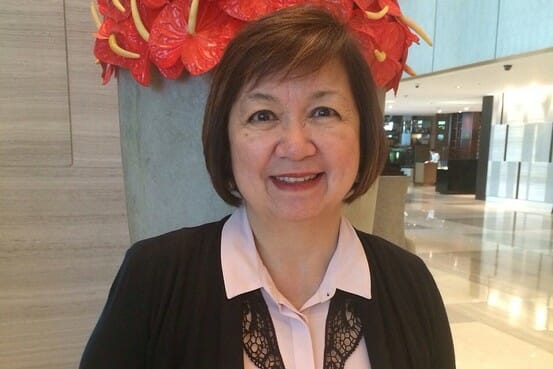
31 Jan 2015 | Focolare Worldwide
 Teresa Ganzon and her husband bought a controlling interest in Bangko Kabayan Inc.in 1989, when it had only one branch, and it now ranks as one of the biggest rural banks in the Philippines. The Ganzon have faced the usual array of developing country business risks, but in an unusual way, because she is also a leader in the Economy of Communion, an international network of more than 800 businesses committed to putting into practice the Catholic social doctrine behind Pope Francis’s controversial comments about business and the economy. In a press conference during his recent trip to the Philippines, the Pope condemned corruption, and even spoke of kicking corrupt officials “where the sun doesn’t shine.” Ms. Ganzon discussed with Risk & Compliance Journal how Bangko Kabayan has grown while doing business in a manner consistent with that doctrine, in one of the world’s more corrupt countries. What are the main points of friction for a business managed in accordance with Catholic social doctrine in the Philippines? Ms. Ganzon: Compliance is the biggest problem we talk about. For example, people excuse their noncompliance by saying we have corrupt politicians that just steal from public coffers, or we don’t see commensurate benefits getting down to us as citizens so, why should we support the government with our taxes? Paying the right amount of taxes is a sign of contradiction, especially among small and medium-size companies. Bribery is rampant and unfortunately is embedded in certain government offices so that a businessman feels the only way his business can survive is to do as everyone does and simply input the bribe or grease money as a “normal cost” of doing business. This contradicts the Catholic social doctrine and Pope Francis. How do you deal with such embedded corruption? Ms. Ganzon: An Economy of Communion business upholds adherence to ethical standards and is conscious that it has a vocation to change the way things are done, to be more aligned with Christian values. For example, some years ago we were all set to offer a certain loan product we were sure would have a big demand and good margins, easy collection, etc. But when we faced a government bureaucrat whose signature and cooperation were indispensable to the collection process, he asked for a percentage of each collection to be paid to him. We could find no way around this obstacle and eventually, we had to think of another loan product. Also, in the Philippines, tax compliance for enterprises big and small has been almost nonexistent. We received an award certifying us as one of the top five tax payers in a region where there are some large manufacturing firms – much larger than our bank. You walked away from a business opportunity rather than engage in corruption? Ms. Ganzon: Yes, but then we learned about microfinance. It addressed financing needs of a segment of society considered “unbankable” then by many formal financing institutions. We developed a microfinance program instead, and discovered we had a bigger segment to be served, albeit not as easily as that of the former, which was a simple salary loan to a government sector. Many times over, this hard choice is presented to us. Often, we have to give up an original idea or product that might have given us good margins, just because somewhere in the process, petty bribery (or not so petty bribery!) was necessary to get the loan collateral registered. But somehow, we get more original ideas about other products where no bribery is necessary and we end up serving a sector that would otherwise have remained underserved, just because we looked harder for alternatives. How Pope’s criticism of business and the economy affected your business? Ms. Ganzon: He talks about having more empathy for people at the bottom of society, and for us, in the microfinance area, it helps us to have greater resolve. This is very difficult business to do, because it entails a lot of field work and usually young people, when they apply for work in a bank, think they are going to be working in a very comfortable environment in an air conditioned bank branch. After six months or so they decide they don’t want to do this kind of demanding fieldwork job. So for us, recruiting the correct people who will stay and love what they are doing because of empathy towards the poor is very challenging. We don’t meet efficiency standards that easily and you cannot help but look at performance standards if you want to stay in business. But the Pope’s message is very clear that this is a business we cannot give up on, a vital service for the poor. Source: Wall Street Journal http://blogs.wsj.com/riskandcompliance/2015/01/26/serving-god-and-the-law-at-a-philippine-bank/
Teresa Ganzon and her husband bought a controlling interest in Bangko Kabayan Inc.in 1989, when it had only one branch, and it now ranks as one of the biggest rural banks in the Philippines. The Ganzon have faced the usual array of developing country business risks, but in an unusual way, because she is also a leader in the Economy of Communion, an international network of more than 800 businesses committed to putting into practice the Catholic social doctrine behind Pope Francis’s controversial comments about business and the economy. In a press conference during his recent trip to the Philippines, the Pope condemned corruption, and even spoke of kicking corrupt officials “where the sun doesn’t shine.” Ms. Ganzon discussed with Risk & Compliance Journal how Bangko Kabayan has grown while doing business in a manner consistent with that doctrine, in one of the world’s more corrupt countries. What are the main points of friction for a business managed in accordance with Catholic social doctrine in the Philippines? Ms. Ganzon: Compliance is the biggest problem we talk about. For example, people excuse their noncompliance by saying we have corrupt politicians that just steal from public coffers, or we don’t see commensurate benefits getting down to us as citizens so, why should we support the government with our taxes? Paying the right amount of taxes is a sign of contradiction, especially among small and medium-size companies. Bribery is rampant and unfortunately is embedded in certain government offices so that a businessman feels the only way his business can survive is to do as everyone does and simply input the bribe or grease money as a “normal cost” of doing business. This contradicts the Catholic social doctrine and Pope Francis. How do you deal with such embedded corruption? Ms. Ganzon: An Economy of Communion business upholds adherence to ethical standards and is conscious that it has a vocation to change the way things are done, to be more aligned with Christian values. For example, some years ago we were all set to offer a certain loan product we were sure would have a big demand and good margins, easy collection, etc. But when we faced a government bureaucrat whose signature and cooperation were indispensable to the collection process, he asked for a percentage of each collection to be paid to him. We could find no way around this obstacle and eventually, we had to think of another loan product. Also, in the Philippines, tax compliance for enterprises big and small has been almost nonexistent. We received an award certifying us as one of the top five tax payers in a region where there are some large manufacturing firms – much larger than our bank. You walked away from a business opportunity rather than engage in corruption? Ms. Ganzon: Yes, but then we learned about microfinance. It addressed financing needs of a segment of society considered “unbankable” then by many formal financing institutions. We developed a microfinance program instead, and discovered we had a bigger segment to be served, albeit not as easily as that of the former, which was a simple salary loan to a government sector. Many times over, this hard choice is presented to us. Often, we have to give up an original idea or product that might have given us good margins, just because somewhere in the process, petty bribery (or not so petty bribery!) was necessary to get the loan collateral registered. But somehow, we get more original ideas about other products where no bribery is necessary and we end up serving a sector that would otherwise have remained underserved, just because we looked harder for alternatives. How Pope’s criticism of business and the economy affected your business? Ms. Ganzon: He talks about having more empathy for people at the bottom of society, and for us, in the microfinance area, it helps us to have greater resolve. This is very difficult business to do, because it entails a lot of field work and usually young people, when they apply for work in a bank, think they are going to be working in a very comfortable environment in an air conditioned bank branch. After six months or so they decide they don’t want to do this kind of demanding fieldwork job. So for us, recruiting the correct people who will stay and love what they are doing because of empathy towards the poor is very challenging. We don’t meet efficiency standards that easily and you cannot help but look at performance standards if you want to stay in business. But the Pope’s message is very clear that this is a business we cannot give up on, a vital service for the poor. Source: Wall Street Journal http://blogs.wsj.com/riskandcompliance/2015/01/26/serving-god-and-the-law-at-a-philippine-bank/
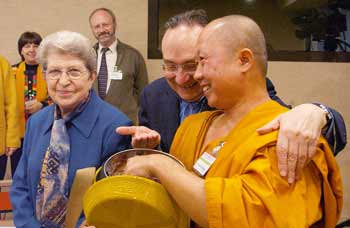
30 Jan 2015 | Focolare Worldwide

Natalia Dallapiccola, Peppuccio Zanghì, Luce Ardente
«When Luce Ardente started to bear witness to the Ideal of unity among the Buddhist monks, Giuseppe Maria Zanghì, or Peppuccio as many called him, and who passed away a few days ago, said that he was “a new St. Paul for Buddhism”.
Knowing how difficult it is for a monk to take part in a Christian and foreign movement, I had doubts about how this affirmation could concretely come about. Now, after precisely 20 years, I must say that those words are coming true.
It all began in 1995, when a Buddhist monk set foot for the very first time in the centre of the Focolare Movement: his name then was, Phramaha Thongrattana Thavorn. He had arrived in Rome to accompany one of his disciples, Somjit, who, for a short period before his marriage, was living an experience of monastery life, in line with tradition of all Buddhist youths. On that occasion, Phramaha Thongrattana Thavorn, translated as ‘fine gold,’ met Chiara Lubich and was very impressed. She was also struck by him, and on his request, gave him a new name: Luce Ardente (Ardent Light).
In all those years of acquaintance I had never noted in him, such a impelling force and enthusiasm as in those days, in announcing universal brotherhood, “mother Chiara’s ideal” (as he still calls her today). Today, while participating in an important ceremony as Luce Ardente’s guest, before the 120 monks and the highest Buddhist authorities of the region, he took the floor to spontaneously but very clearly give a testimonial of his experience with Chiara Lubich and the Focolare, and openly declared that he is a member of Chiara’s huge family diffused in more than 120 counties with millions of members.
Unperturbed, the monks listened: some were amused, others interested, and a few were perplexed as would be expected in any “religious community.” Before, during and after the ceremony Luce Ardente, often breaking the rules, greeted those present one by one, manifesting great respect and affection towards the elderly monks.
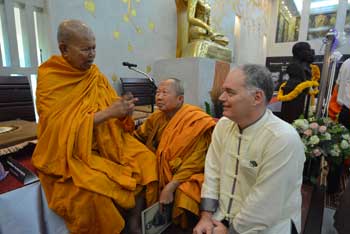 Luce Ardente continues to repeat even now: “The time has come for me to tell everyone how much good Mother Chiara has done to my life as a monk. I feel that she continues to give me an interior impulse and strength to bring the ideal of brotherhood to all.”
Luce Ardente continues to repeat even now: “The time has come for me to tell everyone how much good Mother Chiara has done to my life as a monk. I feel that she continues to give me an interior impulse and strength to bring the ideal of brotherhood to all.”
The death of Peppuccio – who did so much for interreligious dialogue – and the opening of the cause for the beatification of Chiara, are strong and important moments not only for us Christians but for all the members of the Movement.
The day after Chiara passed from earthly life to heaven, on 14 March 2008, Luce Ardente remarked: “Chiara no longer pertains only to you Christians, but she and her ideal are now a legacy for all of humanity.” In these really special days, these facts testify that Peppuccio’s words are becoming a reality before our eyes.
While he participated via live streaming in the opening ceremony of the cause for the beatification of Chiara Lubich, Luce Ardente commented: “Now, more than ever, we must testify to the sanctity of Chiara together.”
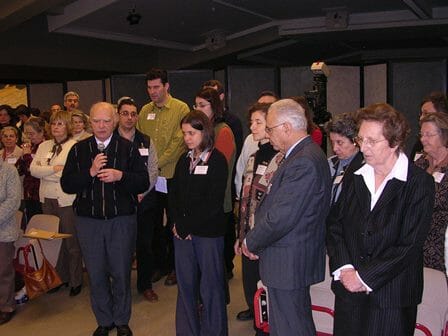
23 Jan 2015 | Focolare Worldwide
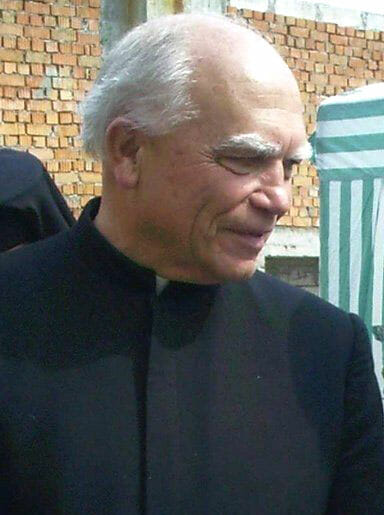 In line with the hopes of Vatican II for many new ecumenical initiatives, towards the end of the 1960s the German Bishops felt the need to strengthen relationships with the Orthodox Church. Bishop Graber of Regensburg – assigned to intensify this dialogue – knew he could count on a highly competent person to carry out this task successfully: Albert Rauch. Ordained as a priest, Albert Rausch completed his theological studies at the Gregorian University of Rome and due to his outstanding sensitivity towards the Greek Orthodox rites, Albert decided to also achieve a Doctorate at the Russicum College, where he took up– among others – Modern Greek and Russian. During his stay in Rome he met the Focolare Movement and embraced its spirituality, and discovered its deep ecumenical dimension . He soon asked to be a member as priest focolarino. To further deepen his knowledge of the Eastern countries, Albert travelled to Greece, Turkey, the Lebanon, Syria and Israel. And to also be part of an official delegation he went to Constantinople, Sophia and Belgrade: and these were the first and important steps that helped the sister Churches to get closer to one another. Patriarch Athenagoras underlined that it was also important for the Eastern youth to go to the West to enrich this mutual acquaintance. This made it possible for many young people of many Orthodox Churches to travel to Germany.. He was entrusted with the newborn Ostkirchliches Institut [Istitute of the Eastern Churches] in Regensburg, role which he accepted humbly and with love. The Bishop asked Chiara Lubich to open a women’s focolare also in Regensburg to help him carry out this task.
In line with the hopes of Vatican II for many new ecumenical initiatives, towards the end of the 1960s the German Bishops felt the need to strengthen relationships with the Orthodox Church. Bishop Graber of Regensburg – assigned to intensify this dialogue – knew he could count on a highly competent person to carry out this task successfully: Albert Rauch. Ordained as a priest, Albert Rausch completed his theological studies at the Gregorian University of Rome and due to his outstanding sensitivity towards the Greek Orthodox rites, Albert decided to also achieve a Doctorate at the Russicum College, where he took up– among others – Modern Greek and Russian. During his stay in Rome he met the Focolare Movement and embraced its spirituality, and discovered its deep ecumenical dimension . He soon asked to be a member as priest focolarino. To further deepen his knowledge of the Eastern countries, Albert travelled to Greece, Turkey, the Lebanon, Syria and Israel. And to also be part of an official delegation he went to Constantinople, Sophia and Belgrade: and these were the first and important steps that helped the sister Churches to get closer to one another. Patriarch Athenagoras underlined that it was also important for the Eastern youth to go to the West to enrich this mutual acquaintance. This made it possible for many young people of many Orthodox Churches to travel to Germany.. He was entrusted with the newborn Ostkirchliches Institut [Istitute of the Eastern Churches] in Regensburg, role which he accepted humbly and with love. The Bishop asked Chiara Lubich to open a women’s focolare also in Regensburg to help him carry out this task.

Centro Internazionale dei Focolari, Castel Gandolfo (Roma) 2003- Conduce una preghiera alla scuola ecumenica
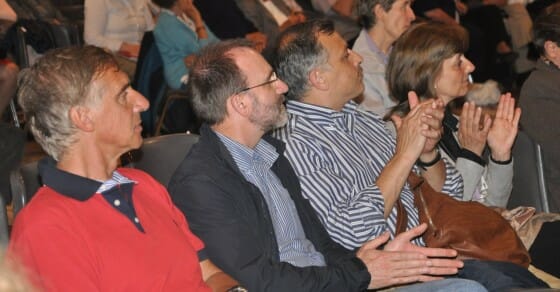
22 Jan 2015 | Focolare Worldwide
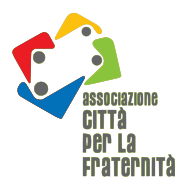 The city of Cannes is the winner of the 7th Chiara Lubich Brotherhood Award, because of its Vivere insieme a Cannes Project (Living together in Cannes), which involves laity and Religious from different faiths in projects and initiatives that promote peaceful coexistence. The Mayor put his signature to the candidate application on January 7, the day of the Charlie Hebdo attack in Paris. Cistercian Abbot, Vladimir Gaudrat, member of the French delegation at the award ceremony, remarked: “There’s a symbol of hatred and there’s a symbol of peace, and we are here because we want to demonstrate the symbol of peace.” The ceremony was held in Rome, Italy, on January 17, 2015 during a conference on dialogue, community and brotherhood, which had been organised by the promoter of the award, the Associazione Città per la Fraternità (Cities for Brotherhood Association). Campidoglio was chosen as the venue for the award ceremony because of its connection to the person after whom the award was named. On January 22, 2000, her 80th birthday, Chiara Lubich was honoured by the citizens of Rome. Already in 1949, just arrived in the capital where she later lived for ten years, she wrote an article titled “Resurrection of Rome” in which she described the city that had been torn by war and misery. In that article she manifested her desire to bring light and love to its homes, streets, centres of learning, workplaces, Parliament and everywhere. She made those wishes again on January 22, 2000, indicating some paths that could incarnate her vision: the Art of Loving, so in line with the name of the capital city. In Italian, “Rome” is written “Roma.” By reversing the word you have “Amor,” which means “Love”. The Art of Loving emerges from values found in the Gospel.
The city of Cannes is the winner of the 7th Chiara Lubich Brotherhood Award, because of its Vivere insieme a Cannes Project (Living together in Cannes), which involves laity and Religious from different faiths in projects and initiatives that promote peaceful coexistence. The Mayor put his signature to the candidate application on January 7, the day of the Charlie Hebdo attack in Paris. Cistercian Abbot, Vladimir Gaudrat, member of the French delegation at the award ceremony, remarked: “There’s a symbol of hatred and there’s a symbol of peace, and we are here because we want to demonstrate the symbol of peace.” The ceremony was held in Rome, Italy, on January 17, 2015 during a conference on dialogue, community and brotherhood, which had been organised by the promoter of the award, the Associazione Città per la Fraternità (Cities for Brotherhood Association). Campidoglio was chosen as the venue for the award ceremony because of its connection to the person after whom the award was named. On January 22, 2000, her 80th birthday, Chiara Lubich was honoured by the citizens of Rome. Already in 1949, just arrived in the capital where she later lived for ten years, she wrote an article titled “Resurrection of Rome” in which she described the city that had been torn by war and misery. In that article she manifested her desire to bring light and love to its homes, streets, centres of learning, workplaces, Parliament and everywhere. She made those wishes again on January 22, 2000, indicating some paths that could incarnate her vision: the Art of Loving, so in line with the name of the capital city. In Italian, “Rome” is written “Roma.” By reversing the word you have “Amor,” which means “Love”. The Art of Loving emerges from values found in the Gospel.  These few thoughts reveal Chiara’s vision of a city, and they inspire the Association that includes 140 Italian comunes. She sees the city as a place inhabited by a community which, in weaving relations between citizens and between citizens and its institutions, can widen its internal and external borders. “Cities,” explains Pasquale Ferrara, General Secretary of the European Institute of Florence, are forever places of pluralism and diversity, where diverse associations collaborate with local institutions for the solution of problems.” Cardinal João Braz de Aviz, Prefect of the Congregation for the Institutes of Consecrated Life, also offered his testimony on the importance of brotherhood in relation to cities, by recalling his experiences in Brazil. “I learned from the Focolare Movement,” the Cardinal recalled, “I learned openness to diversity, which I then experienced in Brasilia. Until I arrived in Rome, where, for me, brotherhood means open contact with everyone.” Lina Ciampi, Secretary of Città per la Fraternità said to the microphone of Vatican Radio: “In this moment that is seeing so many open conflicts – reflecting on brotherhood and dialogue in a community that is changing, with so many feelings, dedicating an entire afternoon to this topic and how to come up with a new cohesion, seems very important to me. Cannes has presented a multi-cultural and interreligious project, in which Buddhists, Jews and Muslims interface. . . It seems to me that it reflects very well what the Association proposes we should do.” Besides the French city of Cannes, awards were also given to the comunes of San Severino and Tolentino nelle Marche for their projects which were directed towards their most vulnerable citizens; Honorary Mention was given to the Comune of Trieste for its Educating For Peace project, which led to the installation of a Cube of Peace in one of its public parks.
These few thoughts reveal Chiara’s vision of a city, and they inspire the Association that includes 140 Italian comunes. She sees the city as a place inhabited by a community which, in weaving relations between citizens and between citizens and its institutions, can widen its internal and external borders. “Cities,” explains Pasquale Ferrara, General Secretary of the European Institute of Florence, are forever places of pluralism and diversity, where diverse associations collaborate with local institutions for the solution of problems.” Cardinal João Braz de Aviz, Prefect of the Congregation for the Institutes of Consecrated Life, also offered his testimony on the importance of brotherhood in relation to cities, by recalling his experiences in Brazil. “I learned from the Focolare Movement,” the Cardinal recalled, “I learned openness to diversity, which I then experienced in Brasilia. Until I arrived in Rome, where, for me, brotherhood means open contact with everyone.” Lina Ciampi, Secretary of Città per la Fraternità said to the microphone of Vatican Radio: “In this moment that is seeing so many open conflicts – reflecting on brotherhood and dialogue in a community that is changing, with so many feelings, dedicating an entire afternoon to this topic and how to come up with a new cohesion, seems very important to me. Cannes has presented a multi-cultural and interreligious project, in which Buddhists, Jews and Muslims interface. . . It seems to me that it reflects very well what the Association proposes we should do.” Besides the French city of Cannes, awards were also given to the comunes of San Severino and Tolentino nelle Marche for their projects which were directed towards their most vulnerable citizens; Honorary Mention was given to the Comune of Trieste for its Educating For Peace project, which led to the installation of a Cube of Peace in one of its public parks.
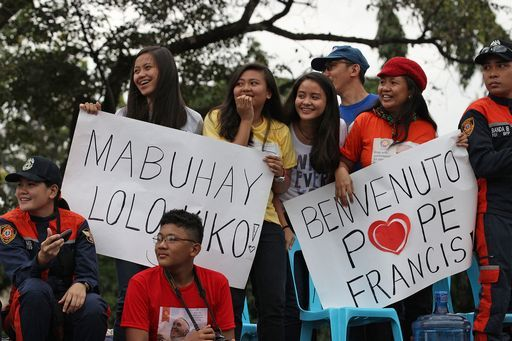
21 Jan 2015 | Focolare Worldwide
 The images of the recent trip of the Pope to Sri Lanka, first, and then to the Philippines, after, have circled the globe. His talks, gestures, phrases, were relaunched by many newspapers in numerous languages and by the social networks that have become powerful multipliers of his message of “mercy and compassion”, the central themes chosen by him for this historical trip.
The images of the recent trip of the Pope to Sri Lanka, first, and then to the Philippines, after, have circled the globe. His talks, gestures, phrases, were relaunched by many newspapers in numerous languages and by the social networks that have become powerful multipliers of his message of “mercy and compassion”, the central themes chosen by him for this historical trip.
«We made history again – they wrote us from Manila – surpassing the biggest gathering recorded in history in the inforgettable World Youth Day of 1995 with John Paul II. In fact, in the mass in Luneta Park, the almost 7 million present showed once more their faith in and love for the Holy Father».
On the second day, 40,000 participants at the meeting with the families at the Mall of Asia, along Manila Bay. Francis encouraged the Filipino families to “serve as sanctuaries where life is respected” and to proclaim the sacredness of life from birth to death.
«I expected a celebrity – Nidj, a youth of the Focolare said– instead, I saw a “servant”. I felt pure, simple, and authentic love as he spoke. He managed to stay humble and be himself in spite of all the attention directed towards him».
And Loli Funk: «There has been much wisdom like a blinding light with the novelty of the call to live an authentic Christian life but one does not even have to be a Catholic to appreciate his messages: they hit us right into the heart of where it hurts and touches us the most. If we are a family, a community that looks after one another, but each one integrally whole, we have better chances of making it».
Romé Vital: «When Pope Francis spoke to the young people yesterday at the University of Santo Tomas, he urged us to live in reciprocity not only to give and give but also to allow ourselves to receive love from God and from others. This is something new to highlight the value of reciprocity in our Christian life».
And still more, Jan Co Chua: «Reflecting on the events with Pope Francis these days, I feel like the apostles on the road to Emmaus… They asked each other, “Were not our hearts burning within us while he talked with us on the road and opened the Scriptures to us?” (Lk 24,32)».
The most moving part of his trip was the visit to the survivors of the zones struck by typhoons, in Tacloban. «we are still in the euphoria of joy brought to us by the historical visit if our Holy Father Pope Francis», the members of the local community of the Focolare wrote to us.
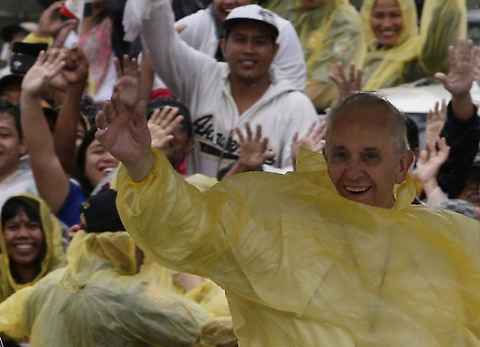 «Francisc is the first Pope to come and visit Tacloban. His visit made us feel the maternal love of God through the Church. We felt understood, consoled, after having suffered so much in the past. We were surprised by his spontaneity in loving: his decision, inspite of the typhoon, to celebrate the mass out in the open with winds that blew strongly. We were touched by his homily, by his humility, when he said that he had no words to say in front of these sufferings and when he asked our forgiveness since he arrived a little bit late …».
«Francisc is the first Pope to come and visit Tacloban. His visit made us feel the maternal love of God through the Church. We felt understood, consoled, after having suffered so much in the past. We were surprised by his spontaneity in loving: his decision, inspite of the typhoon, to celebrate the mass out in the open with winds that blew strongly. We were touched by his homily, by his humility, when he said that he had no words to say in front of these sufferings and when he asked our forgiveness since he arrived a little bit late …».
The community of the Focolare was fully involved in the preparations: «The local Church entrusted to us the preparation of the venue where the mass would be celebrated: the vast open field that could contain 120 thousand people, In front of this very demanding task we asked the help of adherents, sympathizers, friends, relatives, also coming from the other provinces, and we organized a plan which we had prepared for the past three months».
Von, confessed that for many years now he had not been going to mass: «When I was invited to work for the event, I put all my efforts into it. I found my faith once again and also the family of the Focolare».
Some women Volunteers who were in charge of organizing the places for the people, wrote us: «We could have chosen the best places for us to be able to see the Pope. But we chose the farthest places so as to give way to the others. But in the end we were able to greet the Pope up close just the same!».
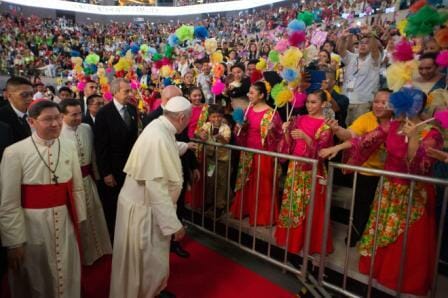 The young Gen worked in the sector of crowd control: «We tried to make love reign above everything else: giving preference to the elderly, to those who had come from faraway (walking for many kilometers) … We were very moved by the words of the Holy Father. We greeted him up close and he smiled at us. What a great joy we felt at this encounter with him!».
The young Gen worked in the sector of crowd control: «We tried to make love reign above everything else: giving preference to the elderly, to those who had come from faraway (walking for many kilometers) … We were very moved by the words of the Holy Father. We greeted him up close and he smiled at us. What a great joy we felt at this encounter with him!».
«The visit of Pope Francis – they concluded – was a unique experience: to be there with all the people, working together for 24 hours under the rain, the strong wind and many other discomforts. His words and the experience we lived will never be erased from our heart!».

 Two voices intertwine in a crescendo of suffering and of hope, of deep emotion and of wonder. They lead us to discover the secret which has brought them to recompose that unity which seemed to be irreparably broken. It is Fili who begins their story: “Nacho and I have been married for 24 years and we have two children. I am the sixth of eleven siblings. There were many sufferings in my family, like that of discovering that my father had another wife and other children and this made me suffer a lot.” “Me, too, as a child,” Nacho continued, “I suffered due to the absence of my father and the lack of attention from my mother. It was my maternal grandmother who took care of me. With Fili we were in love when we got married, but there was a great existential emptiness wherein each one of us identified with the other. We united our solitude, but we didn’t know each other deeply and soon enough we realized that we didn’t know how to love and even what love means.” “Our problems started from the very beginning of our marriage – Fili continued. I was very jealous and possessive, up to the point that Nacho had to continuously change jobs». «Her attitude – Nacho followed – caused feelings of resentment, anger and frustration in me and the discussions between us were never-ending. Our children were born and grew up in this kind of unhospitable atmosphere. Both Fili and I loved them very much, but since there was no love between the two of us, we thought that we could fill this up by showering them with material goods, when instead we should have given them a listening ear, tenderness and affection. Thus 15 years passed. Disappointed by this situation, I left our home. I had already done this before, but every attept to come back and rebuild our relationship failed. What could I do, I asked myself, when a relationships is completely broken?” Fili continued: “In fact for me it was impossible to rebuild it, so much so that I allowed him to return only because I saw how the children suffered because they needed him. One Saturday evening,” Nacho said, “I was watching a boxing match on TV. It didn’t seem to be interesting so I changed the channel. I happened to see a religious program and out of curiosity I continued to watch it. There was a woman (later on I learned that it was Chiara Lubich) who was speaking about Love. Her word had such a strong impact on me. At the end of her talk, they showed some images of the little town of the Focolare Movement in Mexico, that is situated near our town, but which I didn’t know about». “So, the next day,” Fili continued, “we went to Mass at the El Diamante (this is the name of the little town) with the whole family. There I was struck by the way they welcomed us, it was as if they had known us from the beginning. The Mariapolis, a gathering which was going to be held precisely there, was just a week away but we decided to go. The proposal on the first day was the phrase from the Gospel: “Forgive seventy times seven times”. I asked myself: is it possible to forgive always? I found the answer when they spoke to us of Jesus Forsaken: He didn’t only forgive us but he gave his life for us. I realized that in front of such a love, my sufferings were very small. It was not easy to start again, but the Word “Forgive seventy times seven times” has always helped me to do it.” “For me too,” Nacho confided, “‘that Mariapolis turned my life upside down. I learned how to have faith in God for whom everything is possible. With Fili we have learned how to love each other in our diversity. Slowly we have fallen in love once again with one another. We discovered a fullness of love that we have never experienced before, not even when we were engaged, because now we love each other in freedom, in God.”
Two voices intertwine in a crescendo of suffering and of hope, of deep emotion and of wonder. They lead us to discover the secret which has brought them to recompose that unity which seemed to be irreparably broken. It is Fili who begins their story: “Nacho and I have been married for 24 years and we have two children. I am the sixth of eleven siblings. There were many sufferings in my family, like that of discovering that my father had another wife and other children and this made me suffer a lot.” “Me, too, as a child,” Nacho continued, “I suffered due to the absence of my father and the lack of attention from my mother. It was my maternal grandmother who took care of me. With Fili we were in love when we got married, but there was a great existential emptiness wherein each one of us identified with the other. We united our solitude, but we didn’t know each other deeply and soon enough we realized that we didn’t know how to love and even what love means.” “Our problems started from the very beginning of our marriage – Fili continued. I was very jealous and possessive, up to the point that Nacho had to continuously change jobs». «Her attitude – Nacho followed – caused feelings of resentment, anger and frustration in me and the discussions between us were never-ending. Our children were born and grew up in this kind of unhospitable atmosphere. Both Fili and I loved them very much, but since there was no love between the two of us, we thought that we could fill this up by showering them with material goods, when instead we should have given them a listening ear, tenderness and affection. Thus 15 years passed. Disappointed by this situation, I left our home. I had already done this before, but every attept to come back and rebuild our relationship failed. What could I do, I asked myself, when a relationships is completely broken?” Fili continued: “In fact for me it was impossible to rebuild it, so much so that I allowed him to return only because I saw how the children suffered because they needed him. One Saturday evening,” Nacho said, “I was watching a boxing match on TV. It didn’t seem to be interesting so I changed the channel. I happened to see a religious program and out of curiosity I continued to watch it. There was a woman (later on I learned that it was Chiara Lubich) who was speaking about Love. Her word had such a strong impact on me. At the end of her talk, they showed some images of the little town of the Focolare Movement in Mexico, that is situated near our town, but which I didn’t know about». “So, the next day,” Fili continued, “we went to Mass at the El Diamante (this is the name of the little town) with the whole family. There I was struck by the way they welcomed us, it was as if they had known us from the beginning. The Mariapolis, a gathering which was going to be held precisely there, was just a week away but we decided to go. The proposal on the first day was the phrase from the Gospel: “Forgive seventy times seven times”. I asked myself: is it possible to forgive always? I found the answer when they spoke to us of Jesus Forsaken: He didn’t only forgive us but he gave his life for us. I realized that in front of such a love, my sufferings were very small. It was not easy to start again, but the Word “Forgive seventy times seven times” has always helped me to do it.” “For me too,” Nacho confided, “‘that Mariapolis turned my life upside down. I learned how to have faith in God for whom everything is possible. With Fili we have learned how to love each other in our diversity. Slowly we have fallen in love once again with one another. We discovered a fullness of love that we have never experienced before, not even when we were engaged, because now we love each other in freedom, in God.” 


 Luce Ardente continues to repeat even now: “The time has come for me to tell everyone how much good Mother Chiara has done to my life as a monk. I feel that she continues to give me an interior impulse and strength to bring the ideal of brotherhood to all.”
Luce Ardente continues to repeat even now: “The time has come for me to tell everyone how much good Mother Chiara has done to my life as a monk. I feel that she continues to give me an interior impulse and strength to bring the ideal of brotherhood to all.”





